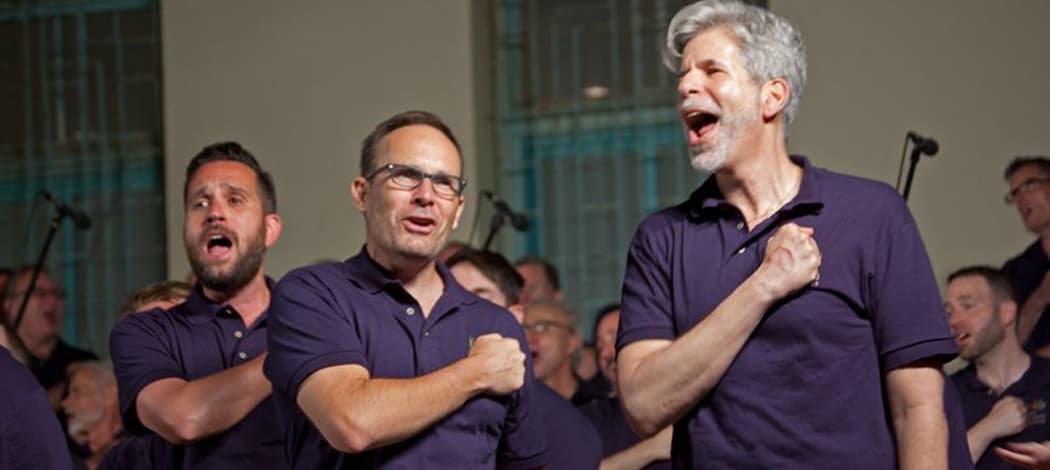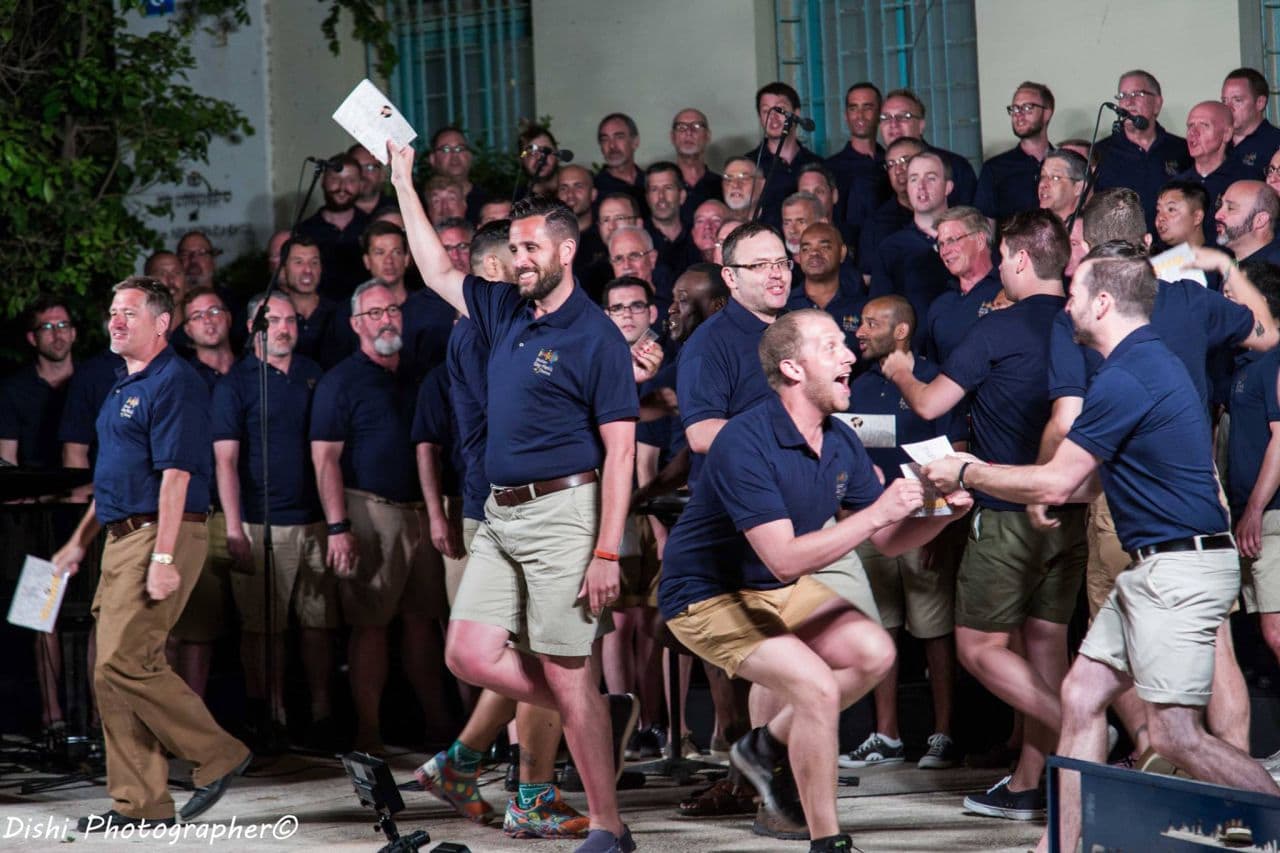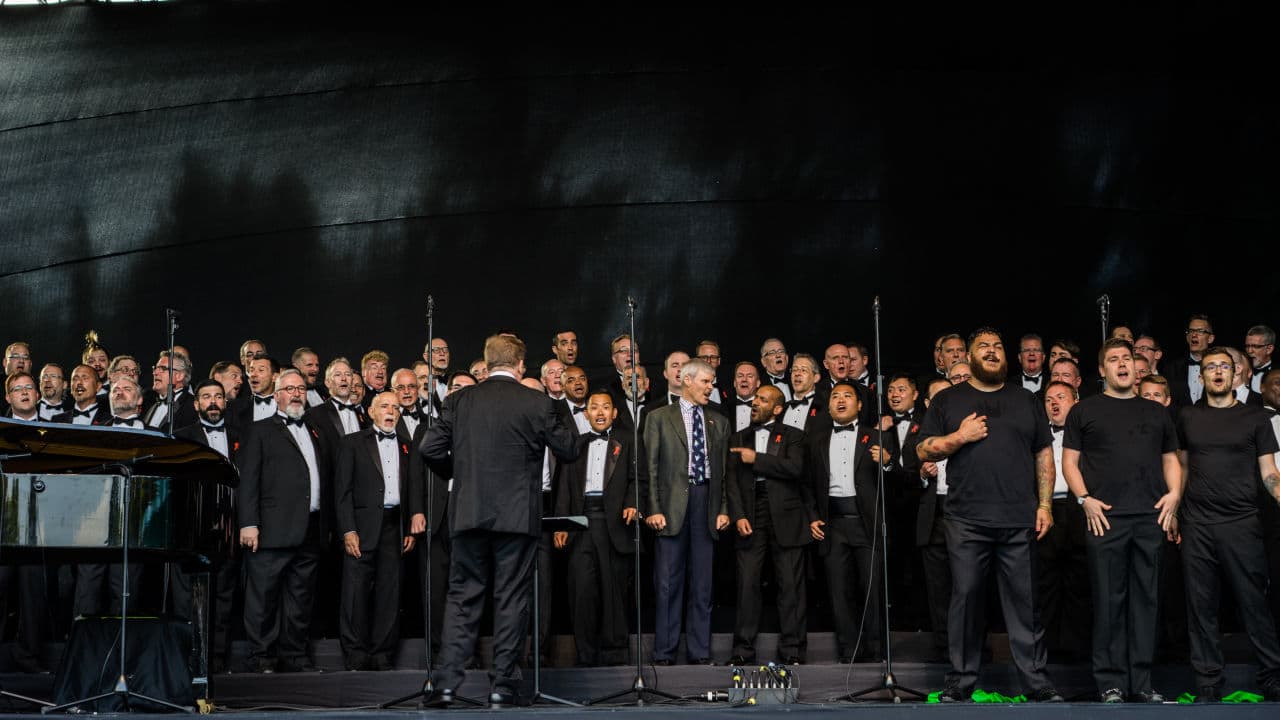Advertisement
Boston Gay Men's Chorus Sings Its Stories Through The Middle East

Kilian Melloy, a theater critic for The ARTery, has been a member of Boston Gay Men’s Chorus since 2009. He accompanied the BGMC as they became the first gay chorus to tour the Middle East this summer.
“Let me write the songs of a nation,” the 18th century Scottish politician Andrew Fletcher is said to have declared, “I don’t care who writes its laws.”
Since its creation in 1982, the Boston Gay Men’s Chorus has been dedicated to the idea that when words fail to build bridges, music can succeed. The Chorus has worked tirelessly to engage, inspire and educate — not through argument, but rather through the intimate, immediately emotional appeal of song.
I have to admit something up front: When I joined the Chorus in 2009, I wasn’t thinking about changing the world through song. I joined because I’m a bit of a ham. I enjoy performing, and I’d been in choruses in high school and college. I also relished the idea of making some new friends. Though I didn't suspect it at the time, even as we were singing toward the lofty goal stated on the BGMC’s website — “to inspire change, build community and celebrate difference” — participation in the Chorus would also change me.
The Chorus, born at the height of the AIDS crisis, has seen — and sung — the recent history of the LGBT equality movement, which reached a new height with the Supreme Court’s recent ruling that made marriage equality the law of the land throughout the United States. Much as any member of the audiences for whom we perform, hearing our stories via music gave me greater understanding and deeper sympathy for my own community.
The proposition that gay chorus members telling their stories through song could be an effective means of outreach came to a pinnacle recently, as the BGMC made a historic tour of the Middle East, the first gay chorus to do so. Our itinerary included three cities and a kibbutz, locales scattered across two countries. As the BGMC took the act on the road, we did so with a powerful new composition on our repertoire, a work by composer Joshua Shank called “Peace.”
Most of our repertoire addresses the issue of LGBT equality in the abstract. “Peace” is, by design, much more direct and specific. The words for the song came directly from the group’s 200 members, who were asked to complete the sentence “I was at peace when…” Shank arranged the responses into a single composition that plays, lyrically and musically, like a suite unto itself. The composition’s several sections transition stylistically from mood to mood, literally taking the listener on a musical journey.
“Music is definitely part of the process which helped out the cause for equality,” Shank reflected, going on to note that song was a central part of the “Singing Revolution” that took place over several years’ time in Estonia from the late 1980s and into the beginning of the ‘90s.
“From my perspective as a composer, I think music has definitely been a part of some people’s stories with regards to the journey to marriage equality,” Shank continued. “I see a lot of LGBT choruses commissioning new music specifically with that goal in mind, and that’s really inspiring.”
“Peace” was paired in some of the BGMC’s Middle East concert dates with another powerful song drawn directly from the LGBT experience. Stephen Schwartz, composer of Broadway hits like “Godspell,” “Pippin” and “Wicked,” created “Testimony” for the San Francisco Gay Men’s Chorus in 2012. Schwartz sourced the lyrics from contributors to the “It Gets Better” project. The result is a work that begins as a cry of anguish before transitioning to joy, triumph and bliss.
The BGMC’s tour began at Ein Gedi, a kibbutz in Israel, before moving on to Jerusalem, Tel Aviv and, finally, Istanbul, Turkey. Audiences in Israel were warm and supportive; so were passersby on the street. It is, after all, hard to miss 100 gay men walking along in ones and twos, clutching garment bags containing tuxedoes. At one point, two men in a car, catching sight of a long line of choristers walking toward the Jerusalem International YMCA, cried out with wild excitement, “Hey! Are you from Boston?” When one BGMC member answered in the affirmative, the men offered another shout: “Go, Red Sox!”
Such interactions played out in stark contrast to the Chorus’ visit to Poland 10 years earlier, when the level of hostility was so intense that a performance in the city of Wrocław nearly had to be cancelled and protesters laid down in the streets to impede the BGMC from reaching the concert hall. It also felt markedly different from years of legislative and social attacks on LGBT families in the United States. But as attitudes have shifted around the globe, a swell of acceptance has seemingly begun to displace the former model of begrudging tolerance. Music has surely played a part in that, from pop icons coming out for LGBT equality to choruses like the BGMC around the country, and the world, reaching out at the local level.
“Music has the ability to break down barriers between people in a non-confrontational way,” the BGMC’s Music Director Reuben M. Reynolds III said. “The BGMC started singing about marriage equality almost 20 years ago in every outreach concert we performed. Slowly but surely our message of marriage equality and equal rights was heard all over the Commonwealth.”
The Chorus also made it a point to be heard on June 14, 2007, as lawmakers in Massachusetts prepared to take a vote on whether to place marriage rights for same-sex families on the ballot.
“On the day the vote for marriage equality was taken at the statehouse, a member of the BGMC visited every member of the legislature and personally delivered a CD of the BGMC singing "Marry Us Today" — as the vote was being taken you could hear it playing all over the statehouse,” Reynolds recalled. “There were many people and many organizations that helped to bring about that wonderful day and I will always be proud that the BGMC’s voice was part of it!” State lawmakers voted against putting marriage rights up for a popular vote.
Outreach has always been part of the BGMC’s mandate, including concerts around the state, often at high schools in support of Gay-Straight Alliance student groups. Outreach efforts on the international scale don’t lie beyond the Chorus’ purview or capacity; they just take a lot more time and effort to put together. Preparations for the tour to the Middle East began more than a year ago.

Concerns around security were part of the equation from the very beginning — not for the group’s safety in Israel, which in many ways is an oasis for gays in a dangerous political desert, but rather in terms of how we would be received in Turkey during the latter part of the tour. The visit to Turkey was designed to be simpler and more tightly controlled than the days spent in Israel: In Tel Aviv, we had the better part of two days to sight-see on our own or lounge on the beach as we pleased, but our time in Istanbul was highly scheduled, much of it centered around popular tourist destinations such as the Basilica Cistern, the Hagia Sophia and the Blue Mosque.
Turkey's religious and political conservatives had begun to hurl invective at the chorus months before our visit, with some Turkish news outlets adopting a Fox News-like approach and dubbing the group “The Boston Gay Men’s Pervert Chorus.” Amid the ensuing controversy, the Zorlu Center — the BGMC’s original venue for the Istanbul concert — withdrew from the event. But a number of other prospective venues promptly stepped up to offer their facilities. It didn’t take the Chorus long to settle on a new venue: the campus of Boğaziçi University, which provided an outdoor stage and about 1,200 chairs for audience seating.
The crowd that showed up to hear the chorus perform at Boğaziçi University far exceeded the available seating, and not a hint of trouble marred the 80-minute set. Though a number of threats had been issued against the event, none of them were deemed especially credible or worrisome; even so, every effort was made to ensure that the outdoor venue would be kept secure.
No one in the crowd or on stage seemed worried; we choristers lost ourselves in the performance with the opening notes, while the audience was uniformly enthusiastic. The repertoire that day included “Peace,” along with a medley of songs from Madonna’s new album, several works by “Wizard of Oz” composer Harold Arlen and a selection of tunes from Schwartz’s “Wicked.” The show had to be kept short and tight, so as to be completed before sundown out of respect for the traditions of the Islamic holy month of Ramadan. That still left time for a single encore number, Katy Perry’s “Firework,” during which Istanbul’s American Consul General Charles Hunter bounded up on stage and joined in the footwork by BGMC choreographer Michelle Chasse. The crowd made it clear they could have continued later, sending up chants of “One more! One more!”

Two significant events bookended the Chorus’ time in Istanbul. The first surprised and delighted us on the very afternoon of our arrival in Turkey. I will never forget standing in line with my Chorus brothers to gain access to the Hagia Sophia, a majestic structure built in 537 originally as a Christian basilica that later became a mosque and now stands as a tourist attraction. Just as the line was starting to move forward into the Hagia Sophia, the phones of various choristers began to light up with the news that the U.S. Supreme Court had ruled in favor of marriage equality. A low-key, but intensely happy celebration broke out, as we hugged and laughed and brushed a few joyful tears from our eyes.
A second, less happy turn of events came about two days later, when — the Istanbul concert behind us — many of us in the Chorus set out to join the Istanbul Pride Parade, an event that had been on our itinerary from the start. But we were in for a shock: About two blocks from our hotel, as we approached a main thoroughfare on the march’s route, uniformed police officers turned us back. The officers politely, but in no uncertain terms, warned us that the Turkish government had summarily revoked the event’s permit. Without a valid permit, any large assembly in Turkey is automatically categorized as a “protest,” and protesting is illegal. With the help of a native tour guide who was with the group and acted as interpreter, the police painted a picture of what might happen to any chorus members who attempted to march: tear gas, water cannons, arrests.
Those things did happen to a number of Turkish protesters. Some individuals from the BGMC did venture out into the streets of their own volition, and against strong admonitions from the chorus leadership not to do so, in order to witness events as they unfolded — events that made global headlines. None of the men from the BGMC were injured or arrested, but for many of us the Turkish government’s abrupt and unilateral reversal was a reminder that our vaunted American freedoms — hard won as they are — are not shared the world over.
Indeed, it’s often a struggle to obtain and hold onto our individual and family liberties even here at home, in the land of the free. That secondary struggle — retaining the civil freedoms we have gained — is only now beginning. Song will doubtless be part of that sustained effort, as well.
Kilian Melloy has reviewed film and theater for a number of publications, including EDGE Boston and the Cambridge Chronicle. He is a member of the Boston Theater Critics Association and the Boston Online Film Critics Association.

